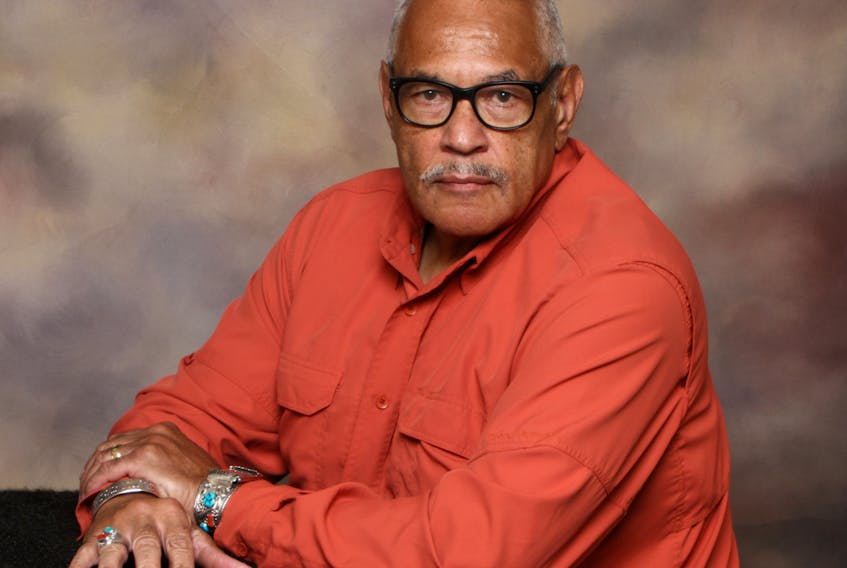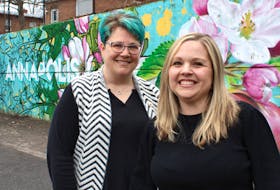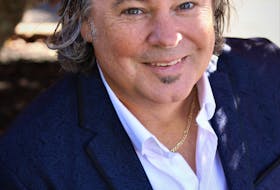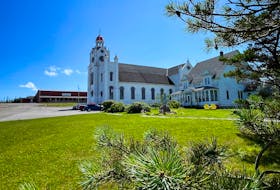Calvin Lawrence will never forget a poster a colleague taped to the outside of a cubicle near his office desk. A caricature of a black man running naked in bare feet was the firing range target. The words, “Official Runnin’ Nigger Target” were scrawled across the top.
During his long career as a police officer, starting in Halifax, Lawrence says he was repeatedly the target of racial slurs, pigeonholed into roles, and denied advancement because he wasn’t white. Sadly, he said his story isn’t unique.
“A significant number of black police officers can relate to my book,” he said during a recent interview from his home in Ottawa. “They read their story in my story.”
Lawrence holds nothing back in Black Cop: My 36 years in Police Work, and My Career-Ending Experiences with Official Racism (James Lorimer and Company), which he wrote with Miles Howe, a former Halifax-based freelance journalist who now lives in Kingston, Ont.
“I’m a retired black cop. I won’t apologize for that. And we can — and will — talk about what that means from a racial perspective,” Lawrence, who was born in Yarmouth in 1949 but grew up in Halifax, writes in the book’s first chapter.
“I am from a time when cops walked the neighbourhoods at night with our toes freezing, jostling doorknobs, crouching down in alleyways in the shadows behind dumpsters and trash cans, with fish heads and grease buckets and broken bottles. And I am from the generation that watched our mothers clean houses and our fathers make bunks on railcars and say “Yes, sir,” and “No, ma’am.” To be a cop was a way to attain a level of prestige and advancement that was otherwise inaccessible to us.”

When Calvin Lawrence joined the Halifax City Police in 1969, he believed he could make a difference. There was growing tension in the city between the black community and the police. The civil rights movement in the United States showed political change was possible and members of the African-American Black Panther Party had just made a visit to Halifax.
“The Panthers brought the real possibility of organized, black-led violence to Halifax,” Lawrence writes. “Their tactics went beyond marching, singing, praying and demonstrating for change. For the first time, there was a real possibility that black people were going to physically push back. It was not business as usual. The possibility of black violence scared the hell out of the city of Halifax and the Halifax Police Department.”
Looking back, Lawrence said he wasn’t hired as part of a plan to bring about real change to what he describes as a racist power structure.
“We black officers were hired because the government was scared shitless and was looking to put black faces in the right places. I call this the colour connection. We were tokens,” he writes.
Lawrence remembers one incident in his early days with the Halifax police force when the officer he was training with stopped a vehicle on Gottingen Street. The black man behind the wheel had done nothing wrong, said Lawrence, but the officer demanded his licence.
“I was standing next to him as this cop took the licence, glanced it over and said, “That’s not your licence!” as he tossed it back at him,” writes Lawrence.
In 1977, Lawrence left Halifax to join the RCMP. He was sent to Newfoundland. As the province’s only black police officer, he was pegged as the black Mountie. He went onto do undercover stints in Edmonton and Toronto, before moving to Ottawa where he protected Prime Minister Brian Mulroney and U.S. President Jimmy Carter. His expertise in security made him a sought-after consultant for police forces across the country who were looking for help with VIP security. But racism, he felt was never far from his life.
Repeated denials of promotion, permission to take courses, and refusal of requests for transfer, led Lawrence to confront his police superiors. He filed freedom of information requests to document what had been done to him and complained to the Human Rights Commission. All of this took a tremendous toll on Lawrence, who had once been a top boxer in Nova Scotia. After 36 years in law enforcement, he retired early in 2006. He suffered from clinical depression and received a settlement from the RCMP after winning a human rights complaint.
“There are some who ask why I ever became a police officer,” he wrote. “I answer because I had a right to. I believed — and I still do — that my community was better served by me in a uniform than by a racist white cop. I had an opportunity thrown in my lap, and I ran with it and made the best of it that I could.”
Calling himself a little radical, Lawrence knows the fight he fought throughout his policing career is far from over. He’s not afraid to talk about racist behavior and to challenge what he calls assimilation fantasies. In his experience, inclusion hasn’t let to diversity and real positive change.
“As black people we need to demonstrate, protest,” he said. “Those are the only things we can do.”
Book news
Andre Fenton, author of Worthy of Love, will be a panellist at the Halifax Black Film Festival. On Feb. 29 at 11:30 a.m. at the Halifax Central Library he’ll take part in the panel, The Danger of a Single Story. The panel will discuss cinematic stereotypes and how they reflect and shape common prejudices and the effect of telling incomplete or inaccurate stories.
Author and English professor Alexander MacLeod will moderate a panel discussing how place, home, and memory intertwine in poet Elizabeth Bishop’s work. Rita Wilson and Emma FitzGerald, the creators of the children’s picture book Pocket of Time: The Poetic Childhood of Elizabeth Bishop, Sandra Barry, a Bishop scholar and author of Elizabeth Bishop, and poet Allison Smith, are the panelists.
The panel will take place on March 2 from 6:30 p.m. to 8:30 p.m. at the Halifax Central Library.
FINALIST
A Pocket of Time is a finalist for the Elizabeth Mrazik-Cleaver Canadian Picture Book Award. The winner will be announced on March 6. Small in the City by Halifax illustrator and author Sydney Smith and Dancing with Daisy by Nova Scotian author Jan Coates and illustrator Josée Bisaillon are also finalists for the prize.
Animals in space
Two chickens and a snake called Miss Creepy were the first animals to fly in a rocket. They are just some of the creatures who have helped pioneer space exploration.
From cats and dogs to chimpanzees and even a colony of honeybees, 50 Animals That Have Been to Space (Formac Publishing Company), tells the stories of dozens of space missions with animals. Halifax-based, husband-and-wife writing team Jennifer and John Read invite young readers to learn about Laika, a part-terrier dog who was launched into orbit aboard Sputnik 2 in 1957, and other animal stories they gathered from the National Aeronautics and Space Administration (NASA) records.
Join the authors at their book launch on March 28 from 2 p.m. to 3 p.m. at the Halifax Central Library and learn how to make your own toilet-paper roll rocket.
Adventure Club
Cape Breton-based author Craig B. Phillips has released Adventure Club: The Broken Time Machine (CP Books). It is the first fiction book in what he hopes will be a series that follows the adventures of four kids who discover a time machine that allows them to travel back in time to England.









